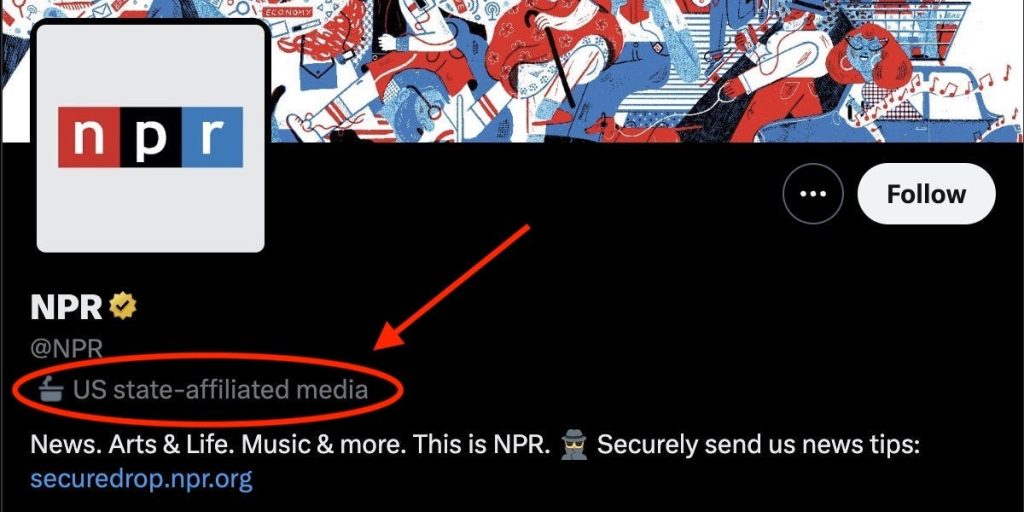- Twitter added a “US state-affiliated media” label to NPR’s account on Tuesday.
- The description is usually reserved for outlets like Russia Today and Xinhua in China.
- NPR reported Thursday that Elon Musk told the outlet the tag might be an error after learning more about the outlet.
Twitter CEO Elon Musk said the company may have made an error in adding a “US state-affiliated media” label on NPR’s Twitter account, a description usually reserved for accounts like Russia Today, which is funded and run by the Russian government, and China’s Xinhua News Agency, the official state news agency of the Chinese government.
NPR reported Thursday that it communicated with Musk in a series of emails disputing the tag since it was placed on its account. After learning more about how much of NPR’s funding comes from the federal government and the outlet’s longstanding editorial independence, Musk allegedly said Twitter “should fix” the mistake.
“The operating principle at new Twitter is simply fair and equal treatment, so if we label non-US accounts as govt, then we should do the same for US, but it sounds like that might not be accurate here,” Musk allegedly wrote in one email to NPR.
According to NPR’s website, less than 1% of its annual operating budget on average comes from grants from the Corporation for Public Broadcasting, and federal agencies and departments. NPR says its top revenue sources are sponsorships from corporations, and NPR Member organization fees. CPB was created by Congress’s Public Broadcasting Act of 1967.
While Musk reportedly admitted it may have been a mistake and said the label is still being evaluated, NPR still has the label as of Friday morning. The outlet hasn’t tweeted since it the tag was added to their account, as any new tweets would come with what the outlet calls a “false disclaimer” labeling their coverage as state-affiliated.
According to Twitter’s Help Center, the label is for media outlets whose editorial content is controlled by the state “through financial resources, direct or indirect political pressures, and/or control over production and distribution.”
NPR was previously mentioned alongside the BBC in the UK as an example of state-financed media organizations that do have editorial independence, and therefore would not be defined “as state-affiliated media for the purposes of this policy,” as shown on Wayback Machine.
However, Twitter has since scrubbed the mention of NPR on that Help Center page. The mention of the BBC, which did not see the label added to its accounts, remains on the page.
“We were disturbed to see last night that Twitter has labeled NPR as ‘state-affiliated media,’ a description that, per Twitter’s own guidelines, does not apply to NPR,” NPR President and CEO John Lansing said in a statement shared with Insider.
“NPR and our Member stations are supported by millions of listeners who depend on us for the independent, fact-based journalism we provide,” Lansing added. “NPR stands for freedom of speech and holding the powerful accountable. It is unacceptable for Twitter to label us this way. A vigorous, vibrant free press is essential to the health of our democracy.”
Musk has interacted with several tweets regarding Twitter’s labeling of NPR, including news reports and users including right-wing commentator Benny Johnson criticizing NPR and its use of federal funds. He has not commented publicly on the reported discussions with NPR, or indicated online that Twitter made a mistake.
Insider contacted Twitter for comment. The company sent back an automated message that did not address the question.
Elon Musk has previously said he finds Russia Today’s “news quite entertaining” in text messages with a former Tesla executive. The texts were revealed in court documents while he was trying to back out of his decision to buy Twitter for $44 billion.
“EU passed a law banning Russia Today and several other Russian news sources. We have been told to block their IP address,” Musk texted Antonio Gracias, after the European Union put out an order last March, banning Russian state media outlets after Russia invaded Ukraine. Musk followed up in another text saying Russia’s media has “lot of bullshit, but some good points too.”
Read the full article here





